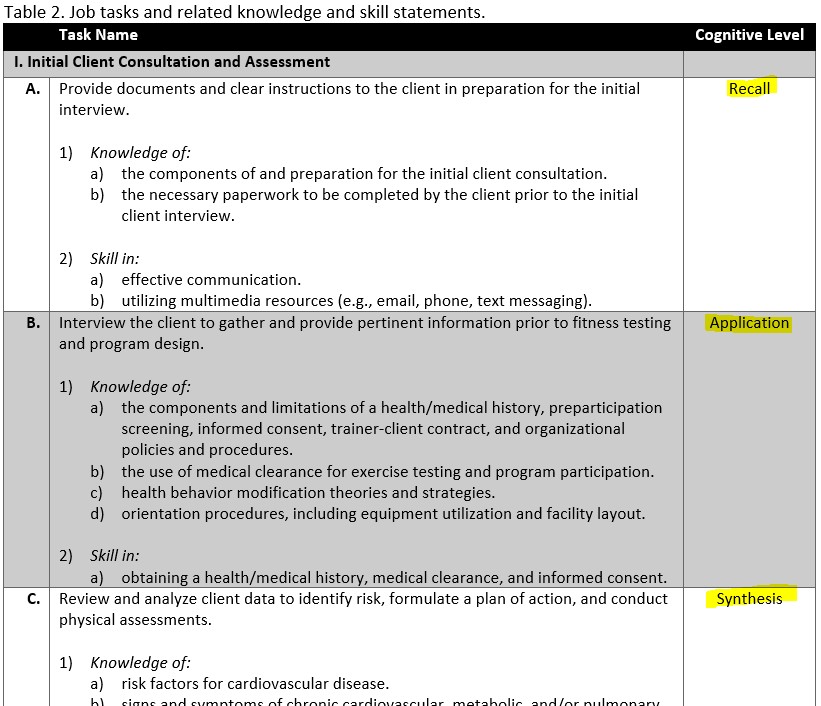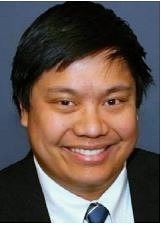Francis Neric, MS, MBA |
July
15, 2019

ACSM Adds Levels of Cognitive Complexity to its Exam Content Outlines
The job of an exercise professional can range from simple and complex tasks. Much in the same way, ACSM exams are written at different levels of cognitive complexity. Cognitive complexity is a way of describing the rigor of certain job tasks. A low level of cognitive processing is simple remembering of information whereas a higher level of cognitive processing includes analysis, evaluations, and judgments. ACSM uses three levels of cognitive challenge: recall, application, and synthesis.
Recall = remember basic facts, information, or steps in a process.
Application = comprehend and implement processes, interpret simple results, or summarize information.
Synthesis = differentiate, relate parts of a system, make judgments on new information based on given criteria, critique a process or product, make recommendations.
Starting in 2017, ACSM included these cognitive levels into its ACSM-GEI, ACSM-CPT, ACSM-EP, and ACSM-CEP exam content outlines. It is important for candidates to note that exam questions are written with the cognitive complexity in mind. For example, it is recommended that a personal trainer candidate should have general knowledge of the documents and instructions provided to clients during an initial interview, while, on the other hand, they should have a strong command of what to do with the information (evaluate risk, develop an exercise plan, select an appropriate physical assessment based on ability/goal/availability/need, etc.); see figure 1.

Figure 1. ACSM-CPT exam content outline excerpt of content domain I.
Below are example questions written at the recall, application, and synthesis level for the ACSM-CPT, ACSM-EP, and ACSM-CEP certification exams:
Recall – Personal Trainer
When should a personal trainer administer a PAR-Q+ to a client?
A. before the fitness evaluation
B. following the first exercise session
C. during the physician’s medical examination
D. after creating an exercise prescription
Application – Exercise Physiologist
An exercise physiologist is conducting a Bruce submaximal treadmill test. Near the end of stage 2, the client reports that they are starting to experience chest discomfort. The client indicates that they would like to continue. Which of the following is the most appropriate?
A. Continue to stage 3.
B. Maintain the speed and gradient.
C. Decrease the speed and gradient by 2%.
D. Discontinue the test.
Synthesis – Clinical Exercise Physiologist
A phase II cardiac rehab patient with history of MI/PCI experiences chest discomfort and shortness of breath during exercise. The single lead ECG is indeterminate for ST changes.
Vitals are as follows:
- SaO2 – 96%
- Heart rate – 112 bpm
- Blood pressure – 132/88 mm Hg
- Symptoms do not improve with seated rest and sublingual nitroglycerin.
What step is the most appropriate to perform next?
A. Check blood glucose.
B. Obtain a 12-lead ECG.
C. Give supplemental oxygen.
D. Have patient perform Valsalva maneuver.
Regardless of cognitive complexity used, ACSM Credential Committees review the performance of each question before making it live on an exam through a process called pre-testing. Pre-testing allows exam developers to gather statistical information about new questions without affecting a candidate’s performance on the exam. Pre-test items are randomly placed throughout the exam and will appear the same as scored items. Candidates should treat every item as if it will be scored.
Author: 
Francis Neric, MS, MBA,
is the national director of certification for the American College of Sports Medicine (ACSM). Neric leads the development and administration of ACSM's state-of-the-art certification programs. He also serves on the Committee on Accreditation for the Exercise Sciences (CoAES) and Coalition for the Registration of Exercise Professionals (CREP) which directly supports the mission, vision, and values of the college. Neric has a BS degree in exercise science from CSU Long Beach, a MS degree in clinical exercise physiology from CSU Fullerton, and an MBA in management from the University of Colorado at Colorado Springs.